When Winter Park High School’s Gender-Sexuality Alliance met for the first time this school year, the LGBTQ+ student club was noticeably smaller than in years past. Nia Larkins, a 15-year-old sophomore at the Orlando, Florida campus, estimated that at least 35 students attended a September 2022 meeting of the Queer Student Union, an activism-focused club that has since disbanded. The GSA, which was formed to replace it, kicked off the 2023 fall semester with 12 kids eating cheese and crackers.
Numbers have dropped precipitously in the weeks since, with a subsequent meeting of the group drawing just seven attendees.
“It’s a morale issue,” Larkins said. “Everyone seems like they’ve given up. It’s just discouraging. I would like to believe that there’s hope, but all the kids are feeling like they don’t know what to do. There’s not really anything we can do.”
The decreasing numbers, Larkins said, are the end result of a new Florida Board of Education regulation enacted this August requiring students to obtain parental permission slips before joining any extracurricular activity. The condition has made it extremely difficult for LGBTQ+ students to organize on campus — affecting dozens of student clubs in Florida established to support LGBTQ+ youth and their allies.
The policy is itself an outgrowth of continued expansions in Florida’s controversial “Parental Rights in Education” statute, or HB 1557, which supporters of LGBTQ+ rights have branded the “Don’t Say Gay” law. The original version of HB 1557 signed by Gov. Ron DeSantis (R) in March 2022 prohibited “discussion about sexual orientation or gender identity” in K-3 classrooms, but lawmakers broadened the scope to cover all elementary and middle school curricula. Ten other U.S. states currently have laws on the books similar or identical to HB 1557.
While Florida’s restrictions on LGBTQ+ education don’t explicitly target GSAs, the new policies are having a chilling effect on these groups. Students said the new permission slip rules have dissuaded many of their LGBTQ+ peers from attending their school’s GSA, in fear of being outed to their parents.
“We’ve seen a lot of students grapple with: ‘Do I try to ask my parents if I can come?’” said Scarlett Syler, a 17-year-old senior at Boone High School in Orlando. “Children need to be told that they’re loved. They need to be told that they have worth because at this age you don’t have years and years of self-confidence to rely on. What schools need to be doing is telling everyone that they matter, and [these policies make] that virtually impossible.”
Chilling effect
The Florida regulations allow the state to effectively bypass the Equal Access Act, a 1984 law that prevents schools from discriminating against student-led extracurricular clubs in the provision of resources and on-campus spaces to meet. While the law’s first boosters were Christian groups fighting to ensure students had the ability to meet for Bible study on campus, LGBTQ+ advocates have more recently utilized the Equal Access Act to prevent schools from blocking the creation of GSAs.
Maxx Fenning, executive director of the education advocacy group PRISM, said that what makes the permission-slip policy “super heinous” is that it appears to abide by federal law by treating all student groups equally but in practice singles out LGBTQ+ students. Florida students now have to get parental consent before joining any extracurricular club, not just LGBTQ+ groups, but Fenning said the discriminatory nature of the policy is evident in the fine print. It also states that school districts may not allow any “adult live performance” on campus grounds, language mirroring the exact wording of a June 2023 law banning minors from attending drag shows, which has temporarily been enjoined in court.
“Nine times out of 10, when they create a permission slip policy for a school district, it’s because the GSA was formed in the district,” Fenning said. “That’s happened in conservative-leaning school districts across the country for the past couple of decades.”

Courtesy of Zai Riviero
Signs from a student protest against HB 1557 at Dr. Phillips High School in Orlando, Fla.
Another major barrier to the formation of GSA groups in Florida is the recent shortage of teachers willing to sign on as club advisors. Schools generally require that extracurricular groups have a faculty sponsor before they are allowed to meet, but some Florida teachers worry their endorsement will be viewed as a violation of HB 1557. Its language is so broadly worded that it is unclear what behaviors are prohibited, said Scott Galvin, executive director of Safe Schools South Florida, an advocacy organization that offers supportive educational resources for LGBTQ+ youth.
The costs for unintentionally breaking the law are steep, Galvin added. If they are investigated, faculty members could be stripped of their teaching license, which would prevent them from even being hired to teach in another state.
“There’s 67 counties in Florida,” he said. “With all of these different counties and all of these different school boards, there’s no clear direction as to how they should or can act. That’s the masterful thing about ‘Don’t Say Gay’ as a law: It’s just written so vaguely that it’s open to multiple interpretations. Somebody who really wants to use it as a hammer on you can.”
The impact of isolation
With so many obstacles in place, some GSAs in Florida have disbanded altogether. Although there’s no official statewide count as to the number of LGBTQ+ student groups that have been unable to meet, six GSAs in Orange County went into the 2023-2024 school year without faculty sponsors, according to estimates provided by the education advocacy group Florida Freedom to Read. Hope Giselle, director of communications with the GSA Network, a non-profit that assists students in starting LGBTQ+ clubs and operates in all 50 states, said the group saw a 75% drop in GSA registrations nationally between the first week of the previous school year and the current one. At least some of these schools, Giselle said, are located in Florida.
Brian Dittmeier, director of public policy with GLSEN, an advocacy group that furthers safe learning environments for LGBTQ+ students, added that making it more difficult for LGBTQ+ youth to form GSAs could have an extremely detrimental impact on their overall wellbeing.
“When we’re thinking about how to build a positive school environment for LGBTQ+ students, stopping GSAs is the opposite of what we should be doing,” he said. “We should be not only ensuring that there is peer support but doubling down on supportive educators; taking steps to stop bullying, harassment, and discrimination; and making sure that LGBTQ+ students are represented in the school curriculum.”
Even though Winter Park’s GSA is still technically active, members said the atmosphere is more somber than in years past. Hannah Butler, a 15-year-old sophomore, said that a typical meeting consists of students “sitting in the corner playing Uno” because they aren’t sure what else they are permitted to do. A “pro-diversity” mural planned in partnership with the school’s Art Club was canceled by administrators over concerns that the design included rainbows.
In a statement, Michael Ollendorff, the administrator of media relations for Orange County Public Schools, which is home to both Winter Park and Boone High, said the district “strives to provide an inclusive environment for all students.” He noted that Winter Park’s GSA participated in Spirit Day, a national anti-bullying event organized by the LGBTQ+ advocacy group GLAAD, at their school.
“Winter Park High School prides itself on providing all their students with opportunities to lead after school clubs,” Ollendorff said in an email to Youth Today.
Keeping each other safe
To avoid scrutiny under Florida’s new regulation, the Winter Park GSA is considering changing its name to something non-LGBTQ+ specific. A GSA at a nearby school rebranded itself The Human League, which also happens to be the name of a 1980s new wave group, but LGBTQ+ students said that they are most focused right now on keeping each other safe. Butler said she’s witnessed a dramatic uptick in harassment and bullying on campus over the past 12 months, including students yelling homophobic slurs at their LGBTQ+ peers in the hallways.
In a statement, Orange County Schools affirmed that the district is “committed to the safety of all students, regardless of race, color, religion, age, sex, national origin, marital status, disability, sexual orientation, genetic information, gender identity or expression, language spoken, homelessness, or any other reason prohibited by law.”
Ollendorff also linked to proclamations from the district in support of Pride Month and LGBTQ+ History Month.
Butler said, nonetheless, that LGBTQ+ students at Winter Park remain “scared and unsettled,” unsure of who is safe or where they can be themselves freely. “The only good thing that has come out of this is a stronger community between LGBTQ+ students because we see how we’re being marginalized,” she said. “That does bring us closer together, but it alienates us from the rest of the school even more. There’s more of a support system between students because of how much the system has turned its back on us.”
***
Nico Lang is a Los Angeles-based journalist who covers the fight for LGBTQ+ equality.






























